2016年高考全国3卷英语试题(含答案)
- 格式:doc
- 大小:109.50 KB
- 文档页数:13
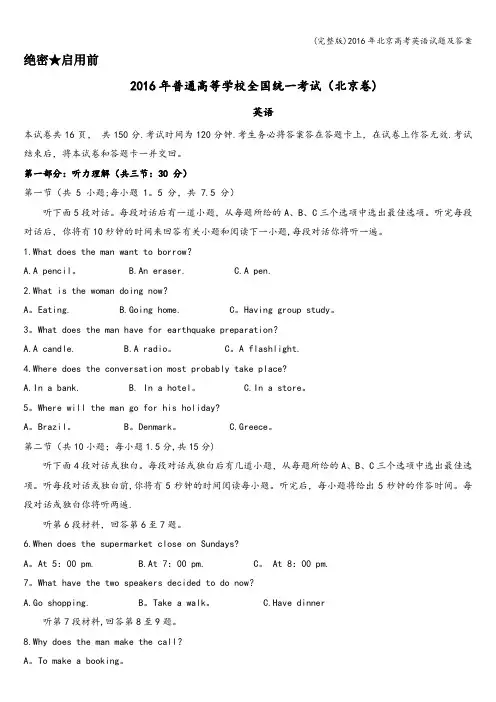
绝密★启用前2016年普通高等学校全国统一考试(北京卷)英语本试卷共16页,共150分.考试时间为120分钟.考生务必将答案答在答题卡上,在试卷上作答无效.考试结束后,将本试卷和答题卡一并交回。
第一部分:听力理解(共三节:30 分)第一节(共 5 小题;每小题 1。
5 分,共 7.5 分)听下面5段对话。
每段对话后有一道小题,从每题所给的A、B、C三个选项中选出最佳选项。
听完每段对话后,你将有10秒钟的时间来回答有关小题和阅读下一小题,每段对话你将听一遍。
1.What does the man want to borrow?A.A pencil。
B.An eraser.C.A pen.2.What is the woman doing now?A。
Eating. B.Going home. C。
Having group study。
3。
What does the man have for earthquake preparation?A.A candle.B.A radio。
C。
A flashlight.4.Where does the conversation most probably take place?A.In a bank.B. In a hotel。
C.In a store。
5。
Where will the man go for his holiday?A。
Brazil。
B。
Denmark。
C.Greece。
第二节(共10小题;每小题1.5分,共15分)听下面4段对话或独白。
每段对话或独白后有几道小题,从每题所给的A、B、C三个选项中选出最佳选项。
听每段对话或独白前,你将有5秒钟的时间阅读每小题。
听完后,每小题将给出5秒钟的作答时间。
每段对话或独白你将听两遍.听第6段材料,回答第6至7题。
6.When does the supermarket close on Sundays?A。

2016年⾼考英语新课标IIIIII短⽂改错真题汇总及分析2016年⾼考英语新课标I/ II/ III卷短⽂改错真题汇总1. 2016年⾼考英语新课标I 卷短⽂改错真题第四部分写作第⼀节短⽂改错(共10⼩题,每⼩题1分,满分10分)假定英语课上⽼师要求同桌之间交换修改作⽂,请你修改你同桌写的以下作⽂。
⽂中共有10处语⾔错误,每句中最多有两处。
每处错误仅涉及⼀个单词的增加、删除或修改。
增加:在缺词处加⼀个漏字符号(∧),并在其下⾯写出该加的词。
删除:把多余的词⽤斜线(﹨)划掉。
修改:在错的词下划⼀横线,并在该词下⾯写出修改后的词。
注意:1.每处错误及其修改均仅限⼀词;2.只允许修改10处,多者(从第11处起)不计分。
My uncle is the owner of a restaurant close to that I live.Though not very big,but the restaurant is popular in our area.It is always crowded with customers at mealtimes.Some people even had to wait outside. My uncle tells me that the key to his success is honest. Every day he makes sure that fresh vegetables or high quality oil are using for cooking. My uncle says that he never dreams becoming rich in the short period of time. Instead,he hopes that our business will grow steady.Keys:71. that →where 72. but去掉73. times→time74. had →have 75. honest→honesty76. or→and 77. using →used78. dreams后加of 79. the →a 80.our→his2. 2016年⾼考英语新课标II 卷短⽂改错真题第四部分写作第⼀节短⽂改错(共10⼩题,每⼩题1分,满分10分)假定英语课上⽼师要求同桌之间交换修改作⽂,请你修改你同桌写的以下作⽂。
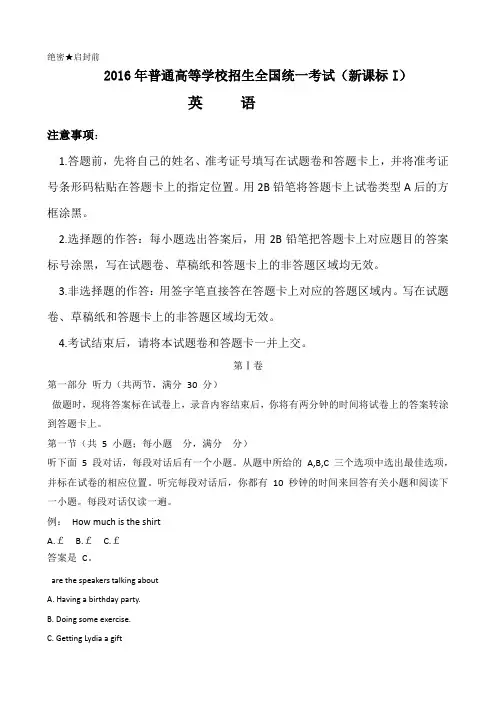
绝密★启封前2016年普通高等学校招生全国统一考试(新课标I)英语注意事项:1.答题前,先将自己的姓名、准考证号填写在试题卷和答题卡上,并将准考证号条形码粘贴在答题卡上的指定位置。
用2B铅笔将答题卡上试卷类型A后的方框涂黑。
2.选择题的作答:每小题选出答案后,用2B铅笔把答题卡上对应题目的答案标号涂黑,写在试题卷、草稿纸和答题卡上的非答题区域均无效。
3.非选择题的作答:用签字笔直接答在答题卡上对应的答题区域内。
写在试题卷、草稿纸和答题卡上的非答题区域均无效。
4.考试结束后,请将本试题卷和答题卡一并上交。
第Ⅰ卷第一部分听力(共两节,满分30 分)做题时,现将答案标在试卷上,录音内容结束后,你将有两分钟的时间将试卷上的答案转涂到答题卡上。
第一节(共 5 小题;每小题分,满分分)听下面 5 段对话,每段对话后有一个小题。
从题中所给的A,B,C 三个选项中选出最佳选项,并标在试卷的相应位置。
听完每段对话后,你都有10 秒钟的时间来回答有关小题和阅读下一小题。
每段对话仅读一遍。
例:How much is the shirtA.£B.£C.£答案是C。
are the speakers talking aboutA. Having a birthday party.B. Doing some exercise.C. Getting Lydia a gift2. What is the woman going to doA. Help the man.B. Take a bus.C. Get a camera3. What does the woman suggest the man doA. Tell Kate to stop.B. Call Kate, s friends.C. Stay away from Kate.4. Where does the conversation probably take placeA. In a wine shop.B. In a supermarket.C. In a restaurant.5. What does the woman meanA. Keep the window closed.B. Go out for fresh air.C. Turn on the fan.听第6段材料,回答第6、7题。
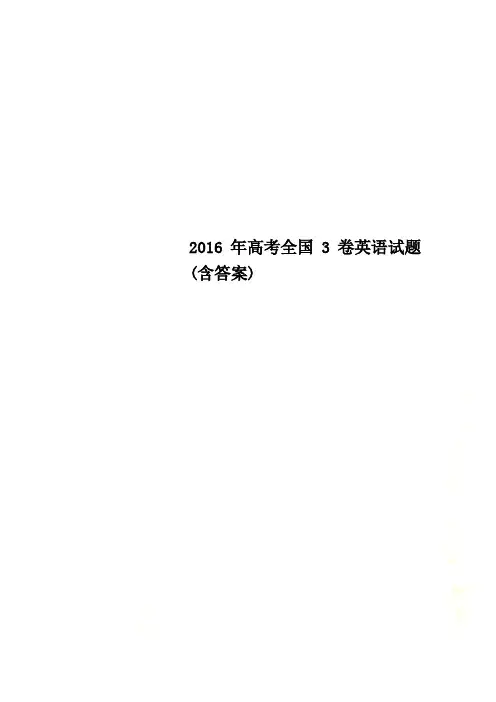
2016年高考全国3卷英语试题(含答案)绝密★启用前6月8日15:00—16:402016年普通高等学校全国统一考试(新课标全国卷III)英语注意事项:本试卷分第I卷(选择题)和第II卷(非选择题)两部分。
考试结束后.将本试卷和答题卡一并交回。
第I卷注意事项:1.答第I卷前,考考生务必将自己的姓名、考生号填写在答题卡上。
2.选出每小题答案后,用铅笔把答题卡上对应的题目的答案标号涂黑。
如需改动,用橡皮擦干净后,在选涂其他答案标号。
不能答在本试卷,否则无效。
第一部分听力(共两节,满分30 分)做题时,先将答案标在试卷上。
录音内容结束后,你将有两分钟的时间将试卷上的答案转涂到答题卡上。
第一节(共5小题;每小题1.5分,满分7.5分)听下面5段对话,每段对话后有一个小题。
从题中所给的A、B、C三个选项中选出最佳选项,并标在试卷的相应位置。
听完每段对话后,你都有10秒钟的时间来回答有关小题和阅读下一小题。
每段对话仅读一遍。
例:How much is the shirt?A. £ 19. 15B. £ 9. 18C. £ 9. 15答案是C。
1. What will Lucy do at 11:30 tomorrow?A. Go out for lunch.B. See her dentist.C. Visit a friend.2. What is the weather like now?C. To take a vacation.15. How long will Dorothy stay in Europe?A. A few days.B. Two weeks.C. Three months.16. What does Dorothy think of her apartment?A. It’s expensive.B. It’s satisfactory.C. It's inconvenient.17 What does Bill offer to do for Dorothy?A. Recommend her apartment to Jim.B. Find a new apartment for her.C. Take care of her apartment.听第10段材料,回答第18至20题。
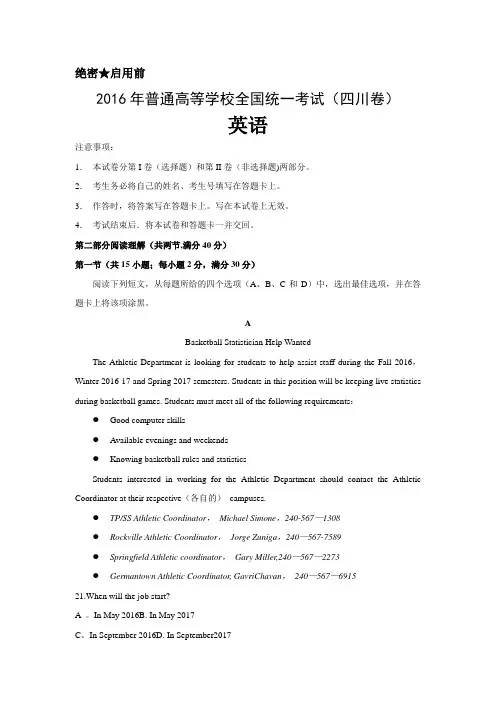
绝密★启用前2016年普通高等学校全国统一考试(四川卷)英语注意事项:1.本试卷分第I卷(选择题)和第II卷(非选择题)两部分。
2.考生务必将自己的姓名、考生号填写在答题卡上。
3.作答时,将答案写在答题卡上。
写在本试卷上无效。
4.考试结束后.将本试卷和答题卡一并交回。
第二部分阅读理解(共两节,满分40分)第一节(共15小题;每小题2分,满分30分)阅读下列短文,从每题所给的四个选项(A、B、C和D)中,选出最佳选项,并在答题卡上将该项涂黑。
ABasketball Statistician Help WantedThe Athletic Department is looking for students to help assist staff during the Fall 2016,Winter 2016-17 and Spring 2017 semesters. Students in this position will be keeping live statistics during basketball games. Students must meet all of the following requirements:●Good computer skills●Available evenings and weekends●Knowing basketball rules and statisticsStudents interested in working for the Athletic Department should contact the Athletic Coordinator at their respective(各自的)campuses.●TP/SS Athletic Coordinator,Michael Simone,240-567—1308●Rockville Athletic Coordinator,Jorge Zuniga,240—567-7589●Springfield Athletic coordinator,Gary Miller,240—567—2273●Germantown Athletic Coordinator, GavriChavan,240—567—691521.When will the job start?A 。
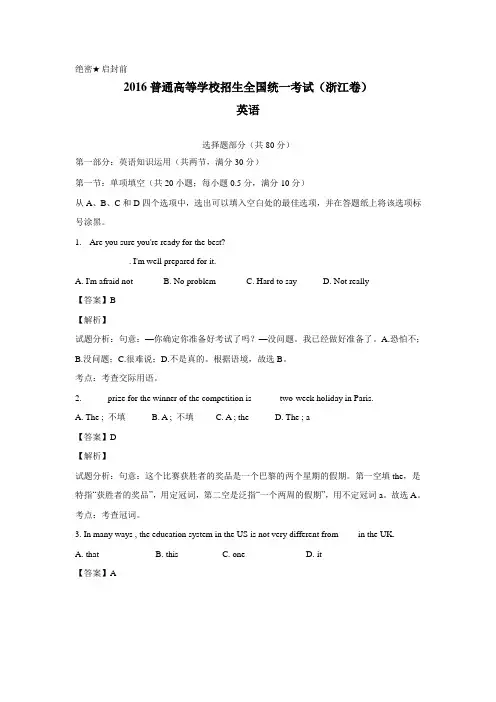
绝密★启封前2016普通高等学校招生全国统一考试(浙江卷)英语选择题部分(共80分)第一部分:英语知识运用(共两节,满分30分)第一节:单项填空(共20小题;每小题0.5分,满分10分)从A、B、C和D四个选项中,选出可以填入空白处的最佳选项,并在答题纸上将该选项标号涂黑。
1. --Are you sure you're ready for the best?--_________. I'm well prepared for it.A. I'm afraid notB. No problemC. Hard to sayD. Not really【答案】B【解析】试题分析:句意:—你确定你准备好考试了吗?—没问题。
我已经做好准备了。
A.恐怕不;B.没问题;C.很难说;D.不是真的。
根据语境,故选B。
考点:考查交际用语。
2.______prize for the winner of the competition is ______two-week holiday in Paris.A. The ; 不填B. A ; 不填C. A ; theD. The ; a【答案】D【解析】试题分析:句意:这个比赛获胜者的奖品是一个巴黎的两个星期的假期。
第一空填the,是特指“获胜者的奖品”,用定冠词,第二空是泛指“一个两周的假期”,用不定冠词a。
故选A。
考点:考查冠词。
3. In many ways , the education system in the US is not very different from ____in the UK.A. thatB. thisC. oneD. it【答案】A考点:考查代词。
4. It is important to pay your electricity bill on time , as late payments may affect your ______.A. conditionB. incomeC. creditD. status【答案】C【解析】试题分析:句意:准时付电费很重要,因为付晚了会影响你的信用。
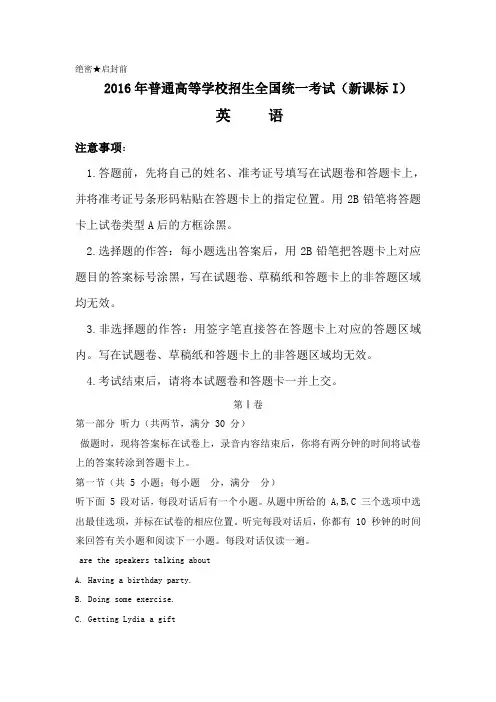
绝密★启封前2016年普通高等学校招生全国统一考试(新课标I)英语注意事项:1.答题前,先将自己的姓名、准考证号填写在试题卷和答题卡上,并将准考证号条形码粘贴在答题卡上的指定位置。
用2B铅笔将答题卡上试卷类型A后的方框涂黑。
2.选择题的作答:每小题选出答案后,用2B铅笔把答题卡上对应题目的答案标号涂黑,写在试题卷、草稿纸和答题卡上的非答题区域均无效。
3.非选择题的作答:用签字笔直接答在答题卡上对应的答题区域内。
写在试题卷、草稿纸和答题卡上的非答题区域均无效。
4.考试结束后,请将本试题卷和答题卡一并上交。
第Ⅰ卷第一部分听力(共两节,满分 30 分)做题时,现将答案标在试卷上,录音内容结束后,你将有两分钟的时间将试卷上的答案转涂到答题卡上。
第一节(共 5 小题;每小题分,满分分)听下面 5 段对话,每段对话后有一个小题。
从题中所给的 A,B,C 三个选项中选出最佳选项,并标在试卷的相应位置。
听完每段对话后,你都有 10 秒钟的时间来回答有关小题和阅读下一小题。
每段对话仅读一遍。
are the speakers talking aboutA. Having a birthday party.B. Doing some exercise.C. Getting Lydia a gift2. What is the woman going to doA. Help the man.B. Take a bus.C. Get a camera3. What does the woman suggest the man doA. Tell Kate to stop.B. Call Kate, s friends.C. Stay away from Kate.4. Where does the conversation probably take placeA. In a wine shop.B. In a supermarket.C. In a restaurant.5. What does the woman meanA. Keep the window closed.B. Go out for fresh air.C. Turn on the fan.听第6段材料,回答第6、7题。
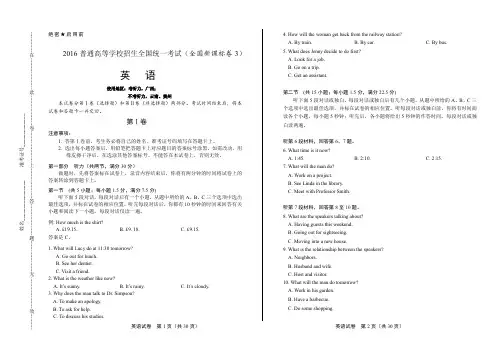
英语试卷 第1页(共30页)英语试卷 第2页(共30页)绝密★启用前 2016普通高等学校招生全国统一考试(全国新课标卷3)英语使用地区:考听力,广西;不考听力,云南、贵州本试卷分第Ⅰ卷(选择题)和第Ⅱ卷(非选择题)两部分。
考试时间结束后,将本试卷和答题卡一并交回。
第Ⅰ卷注意事项:1. 答第Ⅰ卷前,考生务必将自己的姓名、准考证号码填写在答题卡上。
2. 选出每小题答案后,用铅笔把答题卡上对应题目的答案标号涂黑。
如需改动,用橡皮擦干净后,在选涂其他答案标号。
不能答在本试卷上,否则无效。
第一部分 听力(共两节,满分30分)做题时,先将答案标在试卷上,录音内容结束后,你将有两分钟的时间将试卷上的答案转涂到答题卡上。
第一节 (共5小题;每小题1.5分,满分7.5分)听下面5段对话。
每段对话后有一个小题,从题中所给的A 、B 、C 三个选项中选出最佳选项,并标在试卷的相应位置。
听完每段对话后,你都有10秒钟的时间来回答有关小题和阅读下一小题。
每段对话仅读一遍。
例: How much is the shirt? A. £19.15. B. £9. 18. C. £9.15.答案是C 。
1. What will Lucy do at 11:30 tomorrow?A. Go out for lunch.B. See her dentist.C. Visit a friend.2. What is the weather like now? A. It’s sunny. B. It’s rainy.C. It’s cloudy.3. Why does the man talk to Dr. Simpson? A. To make an apology. B. To ask for help.C. To discuss his studies.4. How will the woman get back from the railway station? A. By train.B. By car.C. By bus.5. What does Jenny decide to do first? A. Look for a job. B. Go on a trip. C. Get an assistant.第二节 (共15小题;每小题1.5分,满分22.5分)听下面5段对话或独白。
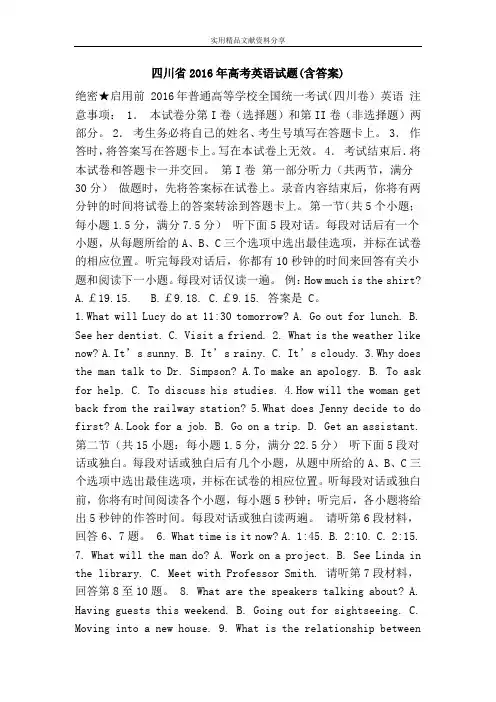
四川省2016年高考英语试题(含答案)绝密★启用前 2016年普通高等学校全国统一考试(四川卷)英语注意事项: 1.本试卷分第I卷(选择题)和第II卷(非选择题)两部分。
2.考生务必将自己的姓名、考生号填写在答题卡上。
3.作答时,将答案写在答题卡上。
写在本试卷上无效。
4.考试结束后.将本试卷和答题卡一并交回。
第I卷第一部分听力(共两节,满分30分)做题时,先将答案标在试卷上。
录音内容结束后,你将有两分钟的时间将试卷上的答案转涂到答题卡上。
第一节(共5个小题;每小题1.5分,满分7.5分)听下面5段对话。
每段对话后有一个小题,从每题所给的A、B、C三个选项中选出最佳选项,并标在试卷的相应位置。
听完每段对话后,你都有10秒钟的时间来回答有关小题和阅读下一小题。
每段对话仅读一遍。
例:How much is the shirt?A.£19.15.B.£9.18.C.£9.15. 答案是 C。
1.What will Lucy do at 11:30 tomorrow? A. Go out for lunch. B. See her dentist. C. Visit a friend.2. What is the weather like now? A.It’s sunny. B. It’s rainy. C. It’s cloudy.3.Why does the man talk to Dr. Simpson? A.To make an apology. B. To ask for help. C. To discuss his studies.4.How will the woman get back from the railway station?5.What does Jenny decide to do first? A.Look for a job. B. Go on a trip. D. Get an assistant. 第二节(共15小题:每小题1.5分,满分22.5分)听下面5段对话或独白。
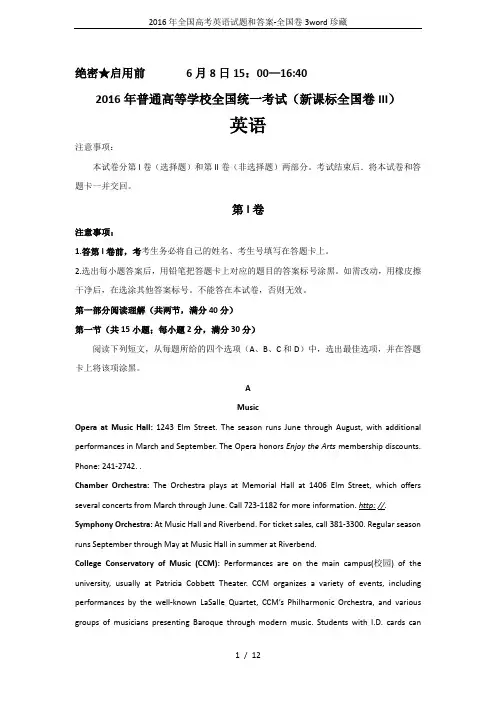
绝密★启用前6月8日15:00—16:402016年普通高等学校全国统一考试(新课标全国卷III)英语注意事项:本试卷分第I卷(选择题)和第II卷(非选择题)两部分。
考试结束后.将本试卷和答题卡一并交回。
第I卷注意事项:1.答第I卷前,考考生务必将自己的姓名、考生号填写在答题卡上。
2.选出每小题答案后,用铅笔把答题卡上对应的题目的答案标号涂黑。
如需改动,用橡皮擦干净后,在选涂其他答案标号。
不能答在本试卷,否则无效。
第一部分阅读理解(共两节,满分40分)第一节(共15小题;每小题2分,满分30分)阅读下列短文,从每题所给的四个选项(A、B、C和D)中,选出最佳选项,并在答题卡上将该项涂黑。
AMusicOpera at Music Hall: 1243 Elm Street. The season runs June through August, with additional performances in March and September. The Opera honors Enjoy the Arts membership discounts. Phone: 241-2742. .Chamber Orchestra: The Orchestra plays at Memorial Hall at 1406 Elm Street, which offers several concerts from March through June. Call 723-1182 for more information. http://. Symphony Orchestra: At Music Hall and Riverbend. For ticket sales, call 381-3300. Regular season runs September through May at Music Hall in summer at Riverbend.College Conservatory of Music (CCM): Performances are on the main campus(校园) of the university, usually at Patricia Cobbett Theater. CCM organizes a variety of events, including performances by the well-known LaSalle Quartet, CCM’s Philharmonic Orchestra, and various groups of musicians presenting Baroque through modern music. Students with I.D. cards canattend the events for free. A free schedule of events for each term is available by calling the box office at 556-4183.Riverbend Music Theater: 6295 Kellogg Ave. Large outdoor theater with the closest seats under cover (price difference).Big name shows all summer long! Phone:232-6220. .1. Which number should you call if you want to see an opera?A. 241-2742.B. 723-1182.C. 381-3300.D. 232-6220.2. When can you go to a concert by Chamber Orchestra?A. February.B. May.C. August.D. November.3.Where can students go for free performances with their I.D. cards?A. Music Hall.B. Memorial Hall.C. Patricia Cobbett Theater.D. Riverbend Music Theater.4. How is Riverbend Music Theater different from the other places?A. It has seats in the open air.B. It gives shows all year round.C. It offers membership discounts.D. It presents famous musical works.BOn one of her trips to New York several years ago, Eudora Welty decided to take a couple of New York friends out to dinner. They settled in at a comfortable East Side cafe and within minutes, another customer was approaching their table.“Hey, aren’t you from Mississippi?”the elegant, white-haired writer remembered being asked by the stranger. “I’m from Mississippi too.”Without a second thought, the woman joined the Welty party. When her dinner partner showed up, she also pulled up a chair.“They began telling me all the news of Mississippi,” Welty said. “I didn’t know what my New York friends were thinking.”Taxis on a rainy New York night are rarer than sunshine. By the time the group got up to leave, it was pouring outside. Welty’s new friends immediately sent a waiter to find a cab. Heading back downtown toward her hotel, her big-city friends were amazed at the turn of eventsthat had changed their Big Apple dinner into a Mississippi.“My friends said: ‘Now we believe your stories,’” Welty added. “And I said: ‘Now you know. These are the people that make me write them.’”Sitting on a sofa in her room, Welty, a slim figure in a simple gray dress, looked pleased with this explanation.“I don’t make them up,” she said of the characters in her fiction these last 50 or so years. “I don’t have to.”Beauticians, bartenders, piano players and people with purple hats, Welty’s people come from afternoons spent visiting with old friends, from walks through the streets of her native Jackson, Miss., from conversations overheard on a bus. It annoys Welty that, at 78, her left ear has now given out. Sometimes, sitting on a bus or a train, she hears only a fragment(片段) of a particularly interesting story.5. What happened when Welty was with her friends at the cafe?A. Two strangers joined her.B. Her childhood friends came in.C. A heavy rain ruined the dinner.D. Some people held a party there.6. The underlined word “them” in Paragraph 6 refers to Welty’s .A. readersB. partiesC. friendsD. stories7. What can we learn about the characters in Welty’s fiction?A. They live in big cities.B. They are mostly women.C. They come from real life.D. They are pleasure seekers.CIf you are a fruit grower—or would like to become one—take advantage of Apple Day to see what’s around. It’s called Apple Day but in practice it’s more like Apple Month. The day itself is on October 21, but since it has caught on, events now spread out over most of October around Britain.Visiting an apple event is a good chance to see, and often taste, a wide variety of apples. Topeople who are used to the limited choice of apples such as Golden Delicious and Royal Gala in supermarkets, it can be quite an eye opener to see the range of classical apples still in existence, such as Decio which was grown by the Romans. Although it doesn’t taste of anything special, it’s still worth a try, as is the knobbly(多疙瘩的) Cat’s Head which is more of a curiosity than anything else.There are also varieties developed to suit specific local conditions. One of the very best varieties for eating quality is Orleans Reinette, but you’ll need a warm, sheltered place with perfect soil to grow it, so it’s a pipe dream for most apple lovers who fall for it.At the events, you can meet expert growers and discuss which ones will best suit your conditions, and because these are family affairs, children are well catered for with apple-themed fun and games.Apple Days are being held at all sorts of places with an interest in fruit, including stately gardens and commercial orchards(果园).If you want to have a real orchard experience, try visiting the National Fruit Collection at Brogdale, near Faversham in Kent.8.What can people do at the apple events?A. Attend experts’ lectures.B. Visit fruit-loving families.C. Plant fruit trees in an orchard.D. Taste many kinds of apples.9.What can we learn about Decio?A. It is a new variety.B. It has a strange look.C. It is rarely seen now.D. It has a special taste.10. What does the underlined phrase “a pipe dream” in Paragraph 3mean?A. A practical idea.B. A vain hope.C.A brilliant plan.D. A selfish desire.11.What is the author’s p urpose in writing the text?A. To show how to grow apples.B .To introduce an apple festival.C. To help people select apples.D. To promote apple research.DBad news sells. If it bleeds, it leads. No news is good news, and good news is no news. Thoseare the classic rules for the evening broadcasts and the morning papers. But now that information is being spread and monitored(监控) in different ways, researchers are discovering new rules. By tracking people’s e-mails and online posts, scientists have found that good news can spread faster and farther than disasters and sob stories.“The ‘if it bleeds’ rule works for mass media,” says Jonah Berger, a scholar at the University of Pennsylvania. “They want your eyeballs and don’t care how you’re feeling. But when you share a story with your friends, you care a lot more how they react. You don’t want them to think of you as a Debbie Downer.”Researchers analyzing word-of-mouth communication—e-mails, Web posts and reviews, face-to-face conversations—found that it tended to be more positive than negative(消极的), but that didn’t necessarily mean people preferred positive news. Was positive news shared more often simply because people experienced more good things than bad things? To test for that possibility, Dr. Berger looked at how people spread a particular set of news stories: thousands of articles on The New York Times’ website. He and a Penn colleague analyzed the “most e-mailed” list for six months. One of his first findings was that articles in the science section were much more likely to make the list than non-science articles. He found that science amazed Times’ readers and made them want to share this positive feeling with others.Readers also tended to share articles that were exciting or funny, or that inspired negative feelings like anger or anxiety, but not articles that left them merely sad. They needed to be aroused(激发) one way or the other, and they preferred good news to bad. The more positive an article, the more likely i t was to be shared, as Dr. Berger explains in his new book, “Contagious: Why Things Catch On.”12 .What do the classic rules mentioned in the text apply to?A. News reports.B. Research papers.C .Private e-mails. D. Daily conversations.13. What can we infer about people like Debbie Downer?A. They’re socially inactive.B. They’re good at telling stories.C. They’re inconsiderate of others.D. They’re careful with their words.14.Which tended to be the most e-mailed according to Dr. Berger’s research?A . Sports new. B. Science articles.C. Personal accounts.D. Financial reviews.15 .What can be a suitable title for the text?A. Sad Stories Travel Far and WideB .Online News Attracts More PeopleC. Reading Habits Change with the TimesD. Good News Beats Bad on Social Networks第二节(共5小题;每小题2分,满分10分)根据短文内容,从短文后的选项中选出能填入空白处的最佳选项。
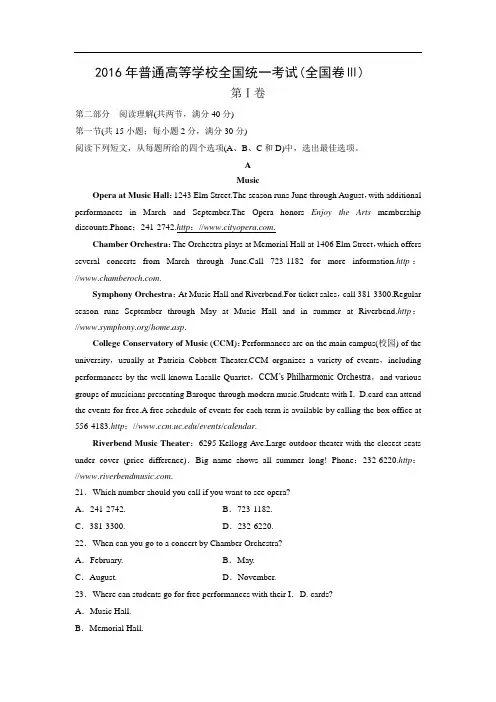
2016年普通高等学校全国统一考试(全国卷Ⅲ)第Ⅰ卷第二部分阅读理解(共两节,满分40分)第一节(共15小题;每小题2分,满分30分)阅读下列短文,从每题所给的四个选项(A、B、C和D)中,选出最佳选项。
AMusicOpera at Music Hall:1243 Elm Street.The season runs June through August,with additional performances in March and September.The Opera honors Enjoy the Arts membership discounts.Phone:241-2742.http://.Chamber Orchestra:The Orchestra plays at Memorial Hall at 1406 Elm Street,which offers several concerts from March through June.Call 723-1182 for more information.http://.Symphony Orchestra:At Music Hall and Riverbend.For ticket sales,call 381-3300.Regular season runs September through May at Music Hall and in summer at Riverbend.http:///home.asp.College Conservatory of Music (CCM):Performances are on the main campus(校园) of the university,usually at Patricia Cobbett M organizes a variety of events,including performances by the well-known Lasalle Quartet,CCM’s Philharmonic Orchestra,and various groups of musicians presenting Baroque through modern music.Students with I.D.card can attend the events for free.A free schedule of events for each term is available by calling the box office at 556-4183.http:///events/calendar.Riverbend Music Theater:6295 Kellogg rge outdoor theater with the closest seats under cover (price difference).Big name shows all summer long! Phone:232-6220.http://.21.Which number should you call if you want to see opera?A.241-2742. B.723-1182.C.381-3300. D.232-6220.22.When can you go to a concert by Chamber Orchestra?A.February. B.May.C.August. D.November.23.Where can students go for free performances with their I.D. cards?A.Music Hall.B.Memorial Hall.C.Patricia Cobbett Theater.D.Riverbend Music Theater.24.How is Riverbend Music Theater different from the other places?A.It has seats in the open air.B.It gives shows all year round.C.It offers membership discounts.D.It presents famous musical works.BOn one of her trips to New York several years ago,Eudora Welty decided to take a couple of New York friends out to dinner.They settled in at a comfortable East Slide cafe and within minutes,another customer was approaching their table.“Hey,aren’t you from Mississippi?” the elegant,white-haired writer remembered being asked by the stranger.“I’m from Mississippi too.”Without a second thought,the woman joined the Welty party.When her dinner partner showed up,she also pulled up a chair.“They began telling me all the news of Mississippi,” Welty said.“I didn’t know what my New York friends were thinking.”Taxis on a rainy New York night are rarer than sunshine.By the time the group got up to leave,it was pouring outside.Welty’s new friends immediately sent a waiter to find a cab.Heading back downtown toward her hotel,her big-city friends were amazed at the turn of events that had changed their Big Apple dinner into a Mississippi state reunion(团聚).“My friend said,‘Now we believe your stories,’” Welty added.“And I said,‘Now you know.These are the people that make me write them.’”Sitting on a sofa in her room,Welty,a slim figure in a simple gray dress,looked pleased with this explanation.“I don’t make them up,” she said of the characters in her fiction these last 50 or so years.“I don’t have to.”Beauticians,bartenders,piano players and people with purple hats,Welty’s people come from afternoons spent visiting with old friends,from walks through the streets of her native Jackson,Miss.,from conversations overheard on a bus.It annoys Welty that,at 78,her left ear has now given out.Sometimes,sitting on a bus or a train,she hears only a fragment(片段) of a particularly interesting story.25.What happened when Welty was with her friends at the cafe?A.Two strangers joined her.B.Her childhood friends came in.C.A heavy rain ruined the dinner.D.Some people held a party there.26.The underlined word “them” in Paragraph 6 refers to Welty’s “”.A.readers B.partiesC.friends D.stories27.What can we learn about the characters in Welty’s fiction?A.They live in big cities.B.They are mostly women.C.They come from real life.D.They are pleasure seekers.CIf you are a fruit grower—or would like to become one—take advantage of Apple Day to see what’s around.It’s called Apple Day but in practice it’s more like Apple Month.The day itself is on October 21,but since it has caught on,events now spread out over most of October around Britain.Visiting an apple event is a good chance to see,and often taste,a wide variety of apples.To people who are used to the limited choice of apples such as Golden Delicious and Royal Gala in supermarkets,it can be quite an eye opener to see the range of classical apples still in existence,such as Decio which was grown by the Romans.Although it doesn’t taste of anything special,it’s still worth a try,as is the knobbly(多疙瘩的) Cat’s Head which is more of a curiosity than anything else.There are also varieties developed to suit specific local conditions.One of the very best varieties for eating quality is Orleans Reinette,but you’ll need a warm,sheltered place with perfect soil to grow it,so it’s a pipe dream for most apple lovers who fall for it.At the events,you can meet expert growers and discuss which ones will best suit your conditions,and because these are family affairs,children are well catered for with apple-themed fun and games.Apple Days are being held at all sorts of places with an interest in fruit,including stately gardens and commercial orchards(果园).If you want to have a real orchard experience,try visiting the National Fruit Collection at Brogdale,near Faversham in Kent.28.What can people do at the apple events?A.Attend experts’ lectures.B.Visit fruit-loving families.C.Plant fruit trees in an orchard.D.Taste many kinds of apples.29.What can we learn about Decio?A.It is a new variety. B.It has a strange look.C.It is rarely seen now. D.It has a special taste.30.What does the underlined phrase “a pipe dream” in Paragraph 3 mean?A.A practical idea. B.A vain hope.C.A brilliant plan. D.A selfish desire.31.What is the author’s purpose in writing the text?A.To show how to grow apples.B.To introduce an apple festival.C.To help people select apples.D.To promote apple research.DBad news sells.If it bleeds,it leads.No news is good news,and good news is no news.Those are the classic rules for the evening broadcasts and the morning papers.But now that information is being spread and monitored(监控) in different ways,researchers are discovering new rules.By tracking people’s emails and online posts,scientists have found that good news can spread faster and farther than disasters and sob stories.“The ‘if it bleeds’ rule works for mass media,” says Jonah Berger,a scholar at the University of Pennsylvania.“They want your eyeballs and don’t care how you’re feeling.But when you share a story with your friends,you care a lot more how they react.You don’t want them to think of you as a Debbie Downer.”Researchers analyzing word-of-mouth communication—e-mails,Web posts and reviews,face-to-face conversations—found that it tended to be more positive than negative(消极的),but that didn’t necessarily mean people preferred positive news.Was positive news shared mo re often simply because people experienced more good things than bad things? To test for that possibility,Dr.Berger looked at how people spread a particular set of news stories: thousands of articles on The New York Times’ website.He and a Penn colleague analyzed the “most emailed” list for six months.One of his first findings was that articles in the science section were much more likely to make the list than nonscience articles.He found that science amazed Times’ readers and made them want to share this positive feeling with others.Readers also tended to share articles that were exciting or funny,or that inspired negative feelings like anger or anxiety,but not articles that left them merely sad.They needed to be aroused(激发) one way or the other,and they preferred good news to bad.The more positive an article,the more likely it was to be shared,as Dr.Berger explains in his new book,“Contagious: Why Things Catch On.”32.What do the classic rules mentioned in the text apply to?A.News reports. B.Research papers.C.Private e-mails. D.Daily conversations.33.What can we infer about people like Debbie Downer?A.They’re socially inactive.B.They’re good at telling stories.C.They’re inconsiderate of others.D.They’re careful with their words.34.Which tended to be the most emailed according to Dr.Berger’s research?A.Sports news. B.Science articles.C.Personal accounts. D.Financial reviews.35.What can be a suitable title for the text?A.Sad Stories Travel Far and WideB.Online News Attracts More PeopleC.Reading Habits Change with the TimesD.Good News Beats Bad on Social Networks第二节(共5小题;每小题2分,满分10分)根据短文内容,从短文后的选项中选出能填入空白处的最佳选项。
绝密★启用前6月8日15:00—16:402016年普通高等学校全国统一考试(新课标全国卷III)英语注意事项:本试卷分第I卷(选择题)和第II卷(非选择题)两部分。
考试结束后.将本试卷和答题卡一并交回。
第I卷注意事项:1.答第I卷前,考2.第一部分听力(共两节,满分30分)做题时,先将答案标在试卷上。
答题卡上。
第一节(共5小题;每小题1.5分,满分听下面5段对话,每段对话后有一个小题。
例:A.£ C.£9.15答案是C.Visitafriend.C.It’scloudy.A.Tomakeanapology.B.Toaskforhelp.C.Todiscusshisstudies.4.Howwillthewomangetbackfromtherailwaystation?A.Bytrain.B.Bycar.C.Bybus.5.WhatdoesJennydecidetodofirst?A.Lookforajob.B.Goonatrip.C.Getanassistant.第二节(共15小题;每小题1.5分,满分22.5分)听下面5段对话或独白。
每段对话或独白后有几个小题,从题中所给的A、B、C三个选项中选出最佳选项,并标在试卷的相应位置。
听每段对话或独白前,你将有时间阅读各个小题,每小题5秒钟;听完后,各小题将给出5秒钟的作答时间。
每段对话或独白读两遍。
听第6段材料,回答第6、7题。
6.Whattimeisitnow?A.1:45.B.2:10.C.2:15.7.Whatwillthemando?A.Workonaproject.B.SeeLindainthelibrary.C.MeetwithProfessorSmith.听第7段材料,回答第8至10题。
8.Whatarethespeakerstalkingabout?AHavinggueststhisweekend.B.Goingoutforsightseeing.C.Movingintoanewhouse.听第8C.InKansas.C.Reading.C.Nature.听第9A.Toattendatrainingprogram.B.Tocarryoutsomeresearch.C.Totakeavacation.15.HowlongwillDorothystayinEurope?A.Afewdays.B.Twoweeks.C.Threemonths.16.WhatdoesDorothythinkofherapartment?A.It’sexpensive.B.It’ssatisfactory.C.It'sinconvenient.17WhatdoesBilloffertodoforDorothy?A.RecommendherapartmenttoJim.B.Findanewapartmentforher.C.Takecareofherapartment.听第10段材料,回答第18至20题。
2016年成人高等学校招生全国统一考试英语试题及参考答案一、语音知识(共5题;每题分,共分。
)1. A. notice B. patient C. British D. practice2. A. bicycle B. centre C. city D. income3. A. cloud B. country C. mountain D. round4. A. hand B. habit C. honest D. behind5. A. basket B. hotel C. direct D. express二、词汇与语法知识(共15题;每题分,共分。
)6.My friend Bob always _____ jokes whenever we get together.7. A. says B. tells C. talks D. speaks8.Before Tom got to the cinema, the film ______.9. A .begins B. will begin C. has begun D. had begun10.The driver kept one eye on _____ traffic and the other on _____ map.11. A. the; the B. a; a. C.不填;a D. the;不填9. I couldn’t find my black gloves______.A. nowhereB. anywhereC. everywhereD. somewhere10. Mary picked up her children’s clothes that ______ on the floor.A. lieB. were lyingC. have lainD. will lie11. Jane had already finished cooking ______ the time I got home.A. byB. onC. inD. at12. -- Excuse me. Where is the meeting room?-- Just a second. I’ll have someone _____ you thereA. takesB. takingC. takeD. to take13. I’ll never forget the day _____ I became a doctor.A. thatB. whenC. whereD. which14. Your article is well written, but I think you should _____ it again.A. go overB. go byC. go offD. go against15. There’s plenty of time, so you ______ worry about it.A. wouldn’tB. couldn’tC. mustn’tD. needn’t16. My bedroom was very small, with the window _____ the street.A. facesB. facedC. facingD. to face17. A few days ago l visited a friend of _____ and that day I learned a valuable lesson.A. meB. myC. mineD. myself18. – Would you like to go to the theater with me tonight?– _______, but I don’t think I can afford the time.A. I’d like toB. Well domeC. That’s nothingD. I’m afraid not19. Family members worked hard ______ sure that they had enough food.A. makingB. to makeC. madeD. make20. The light was so _____that I had to cover my eyes.A. naturalB. weakC. softD. bright三、完形填空(共15题;每题2分,共30分。
2016年普通高等学校招生全国统一考试(四川卷)英语答案解析第I卷第一部分听力第一节1.【答案】B【解析】此题为简单的事实细节题。
根据材料中女士的话“but I have an appointment with my dentist at 11:30.”可知女士明天上午11:30要去看牙医,故选B。
原文:M: Lucy, would you like to have lunch with me tomorrow?W: Oh, I'd really love to, but I have an appointment with my dentist at 11:30. Thanks for inviting me.2.【答案】C【解析】此题为简单的事实细节题。
根据材料中女士的问话“Is it still raining?”及男士的回答“No, but there's still lots of clouds.”可知现在虽然雨停了,但是有很多乌云。
原文:W: Peter, how is the weather now? Is it still raining?M: No, but there's still lots of clouds. The weatherman said the sun wouldn't come out until next week.3.【答案】A【解析】此题为意图推断题。
根据材料中男士的话“I'm sorry I was late for class today, Dr. Simpson.”及“I won't let it happen again.”可知男士迟到了在跟他的老师道歉,故选A。
原文:M: I'm sorry I was late for class today, Dr. Simpson.W: Well, I'll let it go this time. But you saw it disturbed the rest of the class.M: Yes, I realized that. I won't let it happen again.4.【答案】C【解析】此题为简单的事实细节题。
2016年成人高等学校招生全国统一考试《英语(高起点)》试题第一部分 选择题(共105分)一、语音知识:共5小题;每题1.5分,共7.5分。
在下列每组单词中,有一个 单词的划线部分与其他单词的划线部分的读音不同。
找出这个词。
1. A. notice B. patient C. British D. practice2. A. bicycle B. centre C. city D. income3. A. cloud B. country C. mountainD. round 4. A. handB. habitC. honestD. behind 5. A. basketB. hotelC. directD. express二、词汇与语法知识:共15小题;每题1.5分,共22.5分。
从每小题的四个选 择项中,选出最佳的一项。
6. My friend Bob always jokes whenever we get together. ( )A. saysB. tellsC. talksD. speaks7. Before Tom got to the cinema, the film .( )A. beginsB. will beginC. has begunD. had begun8. The driver kept one eye on traffic and the other on map.( )A. the; theB. a, aC. 不填,aD. the; 不填 9. I couldn't find my black gloves .( )A. nowhereB. anywhereC. everywhereD. somewhere10. Mary picked up her children's clothes that on the floor.( )A. lieB. were lyingC. have lainD. will lie11. Jane had already finished cooking the time I got home.( )A. byB. onC. inD. at12. ——Excuse me, where is the meeting room?( )——Just a second. I’ll have someone you there.A. takesB. takingC. takeD. to take13. I'll never forget the day I became a doctor. ( )A. thatB. whenC. whereD. which14. Your article is well written, but I think you should it again. ( )A. go overB. go byC. go offD. go against15. There's plenty of time, so you worry about it. ( )A. wouldn'tB. couldn'tC. mustn'tD. needn't16. My bedroom was very small, with the window the the street. ( )A. facesB. facedD. to face C. facing17. A few days ago I visited a friend of and that day I learned a valuable lesson. ( )A. meB. myC. mineD. myself18. ——Would you like to go to the theatre with me tonight?——,but I don't think I can afford the time. ( )A. I'd like toB. Well doneC. That's nothingD. I'm afraid not19. Family members worked hard sure that they had enough food. ( )A. makingB. to makeC. madeD. make20. The light was so that I had to cover my eyes. ( )A. naturalB. weakC. softD. bright三、完形填空:共15小题;每题2分,共30分。
高考英语阅读理解真题(2016-19全国卷3A篇)含解析2016MusicOpera at Music Hall:1243 Elm Street. The season runs June through August, with additional performances in March and September. The Opera honors Enjoy the Arts membership discounts. Phone: 241-2742. .Chamber Orchestra: The Orchestra plays at Memorial Hall at 1406 Elm Street, which offers several concerts from March through June. Call 723-1182 for more information.http: //.Symphony Orchestra: At Music Hall and Riverbend. For ticket sales, call 381-3300. Regular season runs September through May at Music Hall in summer at Riverbend./home.asp.College Conservatory of Music (CCM): Performances are on the main campus(校园) of the university, usually at Patricia CobbettTheater. CCM organizes a variety of events, including performances by the well-known LaSalle Quartet, CCM’s Philharmonic Orchestra, and various groups of musicians presenting Baroque through modern music. Students with I.D. cards can attend the events for free. A free schedule of events for each term is available by calling the box office at 556-4183. /events/ calendar.Riverbend Music Theater:6295 Kellogg Ave. Large outdoor theater with the closest seats under cover (price difference). Big name shows all summer long! Phone: 232-6220..21. Which number should you call if you want to see an opera?A. 241-2742.B. 723-1182.C. 381-3300.D. 232-6220.22. When can you go to a concert by Chamber Orchestra?A. February.B. May.C. August.D. November.23. Where can students go for free performances with their I.D. cards?A. Music Hall.B. Memorial Hall.C. Patricia Cobbett Theater.D. Riverbend Music Theater.24. How is Riverbend Music Theater different from the other places?A. It has seats in the open air.B. It gives shows all year round.C. It offers membership discounts.D. It presents famous musical works.答案语篇分析:文章是一片广告类短文。
2016普通高等学校招生全国统一考试(江苏卷)英语注意事项:1.答题前,先将自己的姓名、准考证号填写在试题卷和答题卡上,并将准考证号条形码粘贴在答题卡上的指定位置。
用2B铅笔将答题卡上试卷类型A后的方框涂黑。
2.选择题的作答:每小题选出答案后,用2B铅笔把答题卡上对应题目的答案标号涂黑,写在试题卷、草稿纸和答题卡上的非答题区域均无效。
3.非选择题的作答:用签字笔直接答在答题卡上对应的答题区域内。
写在试题卷、草稿纸和答题卡上的非答题区域均无效。
4.考试结束后,请将本试题卷和答题卡一并上交。
第Ⅰ卷第一部分听力(共两节,满分 30 分)做题时,现将答案标在试卷上,录音内容结束后,你将有两分钟的时间将试卷上的答案转涂到答题卡上。
第一节(共 5 小题;每小题 1.5 分,满分 7.5 分)听下面 5 段对话,每段对话后有一个小题。
从题中所给的 A、B、C 三个选项中选出最佳选项,并标在试卷的相应位置。
听完每段对话后,你都有10 秒钟的时间来回答有关小题和阅读下一小题。
每段对话仅读一遍。
例: How much is the shirt?A.£ 19.15.B.£ 9.18.C.£ 9.15.答案是 C。
1. What are the speakers talking about?A. Having a birthday party.B. Doing some exercise.C. Getting Lydia a gift.2. What is the woman going to do?A. Help the man.B. Take a bus.C. Get a camera.3. What does the woman suggest the man do?A. Tell Kate’s to stop.B. Call Kate’s friends.C. Stay away from Kate.4. Where does the conversation probably take place?A. In a wine shop.B. In a supermarket.C. In a restaurant.5. What does the woman mean?A. Keep the window closed.B. Go out for fresh air.C. Turn on the fan.第二节(共15小题;每小题1.5分,满分22.5分)听下面5段对话或独白。
绝密★启用前2016年普通高等学校全国统一考试(新课标全国卷III)英语注意事项:本试卷分第I卷(选择题)和第II卷(非选择题)两部分。
考试结束后.将本试卷和答题卡一并交回。
第I卷注意事项:1.答第I卷前,考考生务必将自己的姓名、考生号填写在答题卡上。
2.选出每小题答案后,用铅笔把答题卡上对应的题目的答案标号涂黑。
如需改动,用橡皮擦干净后,在选涂其他答案标号。
不能答在本试卷,否则无效。
第一部分听力(共两节,满分30 分)做题时,先将答案标在试卷上。
录音内容结束后,你将有两分钟的时间将试卷上的答案转涂到答题卡上。
第一节(共5小题;每小题1.5分,满分7.5分)听下面5段对话,每段对话后有一个小题。
从题中所给的A、B、C三个选项中选出最佳选项,并标在试卷的相应位置。
听完每段对话后,你都有10秒钟的时间来回答有关小题和阅读下一小题。
每段对话仅读一遍。
例:How much is the shirt?A. £ 19. 15B. £ 9. 18C. £ 9. 15答案是C。
1. What will Lucy do at 11:30 tomorrow?A. Go out for lunch.B. See her dentist.C. Visit a friend.2. What is the weather like now?A. It’s sunny.B. It’s rainy.C. It’s cloudy.3. Why does the man talk to Dr. Simpson?A. To make an apology.B. To ask for help.C. To discuss his studies.4. How will the woman get back from the railway station?A. By train.B. By car.C. By bus.5. What does Jenny decide to do first?A. Look for a job.B. Go on a trip.C. Get an assistant.第二节(共15小题;每小题1.5分,满分22.5分)听下面5段对话或独白。
每段对话或独白后有几个小题,从题中所给的A、B、C三个选项中选出最佳选项,并标在试卷的相应位置。
听每段对话或独白前,你将有时间阅读各个小题,每小题5秒钟;听完后,各小题将给出5秒钟的作答时间。
每段对话或独白读两遍。
听第6段材料,回答第6、7题。
6. What time is it now?A. 1:45.B. 2:10.C. 2:15.7. What will the man do?A. Work on a project.B. See Linda in the library.C. Meet with Professor Smith.听第7段材料,回答第8至10题。
8. What are the speakers talking about?A Having guests this weekend.B. Going out for sightseeing.C. Moving into a new house.9. What is the relationship between the speakers?A. Neighbors.B. Husband and wife.C. Host and visitor.10. What will the man do tomorrow?A. Work in his garden.B. Have a barbecue.C. Do some shopping.听第8段材料,回答第11至13题。
11. Where was the man born?A. In Philadelphia.B. In Springfield.C. In Kansas.12. What did the man like doing when he was a child?A. Drawing.B. Traveling.C. Reading.13. What inspires the man most in his work?A. Education.B. Family love.C. Nature.听第9段材料,回答第14至17题。
14. Why is Dorothy going to Europe?A. To attend a training program.B. To carry out some research.C. To take a vacation.15. How long will Dorothy stay in Europe?A. A few days.B. Two weeks.C. Three months.16. What does Dorothy think of her apartment?A. It’s expensive.B. It’s satisfactory.C. It's inconvenient.17 What does Bill offer to do for Dorothy?A. Recommend her apartment to Jim.B. Find a new apartment for her.C. Take care of her apartment.听第10段材料,回答第18至20题。
18. What are the tourists advised to do when touring London?A. Take their tour schedule.B. Watch out for the traffic.C. Wear comfortable shoe.19. What will the tourists do in fifteen minutes?A. Meet the speaker.B. Go to their rooms.C. Change some money.20. Where probably is the speaker?A. In a park.B. In a hotel.C. In a shopping centre.第二部分阅读理解(共两节,满分40分)第一节(共15小题;每小题2分,满分30分)阅读下列短文,从每题所给的四个选项(A、B、C和D)中,选出最佳选项,并在答题卡上将该项涂黑。
AMusicOpera at Music Hall: 1243 Elm Street. The season runs June through August, with additional performances in March and September. The Opera honors Enjoy the Arts membership discounts. Phone: 241-2742. .Chamber Orchestra: The Orchestra plays at Memorial Hall at 1406 Elm Street, which offers several concerts from March through June. Call 723-1182 for more information. http: //.Symphony Orchestra: At Music Hall and Riverbend. For ticket sales, call 381-3300. Regular season runs September through May at Music Hall in summer at Riverbend. /home.asp.College Conservatory of Music (CCM): Performances are on the main campus(校园) of the university, usually at Patricia Cobbett Theater. CCM organizes a variety of events, including performances by the well-known LaSalle Quartet, CCM’s Philharmonic Orchestra, and various groups of musicians presenting Baroque through modern music. Students with I.D. cards can attend the events for free. A free schedule of events for each term is available by calling the box office at 556-4183. /events/calendar.Riverbend Music Theater: 6295 Kellogg Ave. Large outdoor theater with the closest seats under cover (price difference). Big name shows all summer long! Phone: 232-6220..21. Which number should you call if you want to see an opera?A. 241-2742.B. 723-1182.C. 381-3300.D. 232-6220.22. When can you go to a concert by Chamber Orchestra?A. February.B. May.C. August.D. November.23. Where can students go for free performances with their I.D. cards?A. Music Hall.B. Memorial Hall.C. Patricia Cobbett Theater.D. Riverbend Music Theater.24. How is Riverbend Music Theater different from the other places?A. It has seats in the open air.B. It gives shows all year round.C. It offers membership discounts.D. It presents famous musical works.BOn one of her trips to New York several years ago, Eudora Welty decided to take a couple of New York friends out to dinner. They settled in at a comfortable East Side cafe and within minutes, another customer was approaching their table.“Hey, aren’t you from Mississippi?” the elegant, white-haired writer remembered being asked by the stranger. “I’m from Mississippi too.”Without a second thought, the woman joined the Welty party. When her dinner partner showed up, she also pulled up a chair.“They began telling me all the news of Mississippi,” Welty said. “I didn’t know what my New York friends were thinking.”Taxis on a rainy New York night are rarer than sunshine. By the time the group got up to leave, it was pouring outside. Welty’s new friends immediately sent a waiter to find a cab. Heading back downtown toward her hotel, her big-city friends were amazed at the turn of events that had changed their Big Apple dinner into a Mississippi state reunion (团聚).“My friends said: ‘Now we believe your stories,’” Welty added. “And I said: ‘Now you know. These are the people that make me write them.’”Sitting on a sofa in her room, Welty, a slim figure in a simple gray dress, looked pleased with this explanation.“I don’t make them up,” she said of the characters in her fiction these last 50 or so years. “Idon’t have to.”Beauticians, bartenders, piano players and people with purple hats, Welty’s people come from afternoons spent visiting with old friends, from walks through the streets of her native Jackson, Miss., from conversations overheard on a bus. It annoys Welty that, at 78, her left ear has now given out. Sometimes, sitting on a bus or a train, she hears only a fragment(片段) of a particularly interesting story.25. What happened when Welty was with her friends at the cafe?A. Two strangers joined her.B. Her childhood friends came in.C. A heavy rain ruined the dinner.D. Some people held a party there.26. The underlined word “them” in Paragraph 6 refers to Welty’s .A. readersB. partiesC. friendsD. stories27. What can we learn about the characters in Welty’s fiction?A. They live in big cities.B. They are mostly women.C. They come from real life.D. They are pleasure seekers.CIf you are a fruit grower — or would like to become one — take advantage of Apple Day to see what’s around. It’s called Apple Day but in practice it’s more like Apple Month. The day itself is on October 21, but since it has caught on, events now spread out over most of October around Britain.Visiting an apple event is a good chance to see, and often taste, a wide variety of apples. To people who are used to the limited choice of apples such as Golden Delicious and Royal Gala in supermarkets, it can be quite an eye opener to see the range of classical apples still in existence, such as Decio which was grown by the Romans. Although it doesn’t taste of anything special, it’s still worth a try, as is the knobbly (多疙瘩的) Cat’s Head which is more of a curiosity than anything else.There are also varieties developed to suit specific local conditions. One of the very best varieties for eating quality is Orleans Reinette, but you’ll need a warm, sheltered place with perfect soil to grow it, so it’s a pipe dream for most apple lovers who fall for it.At the events, you can meet expert growers and discuss which ones will best suit your conditions, and because these are family affairs, children are well catered for with apple-themed fun and games.Apple Days are being held at all sorts of places with an interest in fruit, including stately gardens and commercial orchards (果园). If you want to have a real orchard experience, try visiting the National Fruit Collection at Brogdale, near Faversham in Kent.28. What can people do at the apple events?A. Attend experts’ lectures.B. Visit fruit-loving families.C. Plant fruit trees in an orchard.D. Taste many kinds of apples.29. What can we learn about Decio?A. It is a new variety.B. It has a strange look.C. It is rarely seen now.D. It has a special taste.30. What does the underlined phrase “a pipe dream” in Paragraph 3 mean?A. A practical idea.B. A vain hope.C. A brilliant plan.D. A selfish desire.31. What is the author’s p urpose in writing the text?A. To show how to grow apples. B .To introduce an apple festival.C. To help people select apples.D. To promote apple research.DBad news sells. If it bleeds, it leads. No news is good news, and good news is no news. Those are the classic rules for the evening broadcasts and the morning papers. But now that information is being spread and monitored (监控) in different ways, researchers are discovering new rules. By tracking people’s e-mails and online posts, scientists have found that good news can spread faster and farther than disasters and sob stories.“The ‘if it bleeds’ rule works for mass media,” says Jonah Berger, a scholar at the University of Pennsylvania. “They want your eyeballs and don’t care how you’re feeling. But when you share a story with your friends, you care a lot more how they react. You don’t want them to think of you as a Debbie Downer.”Researchers analyzing word-of-mouth communication—e-mails, Web posts and reviews, face-to-face conversations—found that it tended to be more positive than negative(消极的), but that didn’t necessarily mean people preferred positive news. Was positive news shared more often simply because people experienced more good things than bad things? To test for that possibility, Dr. Berger looked at how people spread a particular set of news stories: thousands of articles on The New York Times’ website. He and a Penn colleague analyzed the “most e-mailed” list for sixmonths. One of his first findings was that articles in the science section were much more likely to make the list than non-science articles. He found that science amazed Times’ readers and made them want to share this positive feeling with others.Readers also tended to share articles that were exciting or funny, or that inspired negative feelings like anger or anxiety, but not articles that left them merely sad. They needed to be aroused(激发) one way or the other, and they preferred good news to bad. The more positive an article, the more likely it was to be shared, as Dr. Berger explains in his new book, “Contagious: Why Things Catch On.”32. What do the classic rules mentioned in the text apply to?A. News reports.B. Research papers. C .Private e-mails. D. Daily conversations.33. What can we infer about people like Debbie Downer?A. They’re socially inactive.B. They’re good at telling stories.C. They’re inconsiderate of others.D. They’re careful with their words.34. Which tended to be the most e-mailed according to Dr. Berger’s research?A. Sports news.B. Science articles.C. Personal accounts.D. Financial reviews.35. What can be a suitable title for the text?A. Sad Stories Travel Far and Wide B .Online News Attracts More PeopleC. Reading Habits Change with the TimesD. Good News Beats Bad on Social Networks第二节(共5小题;每小题2分,满分10分)根据短文内容,从短文后的选项中选出能填入空白处的最佳选项。